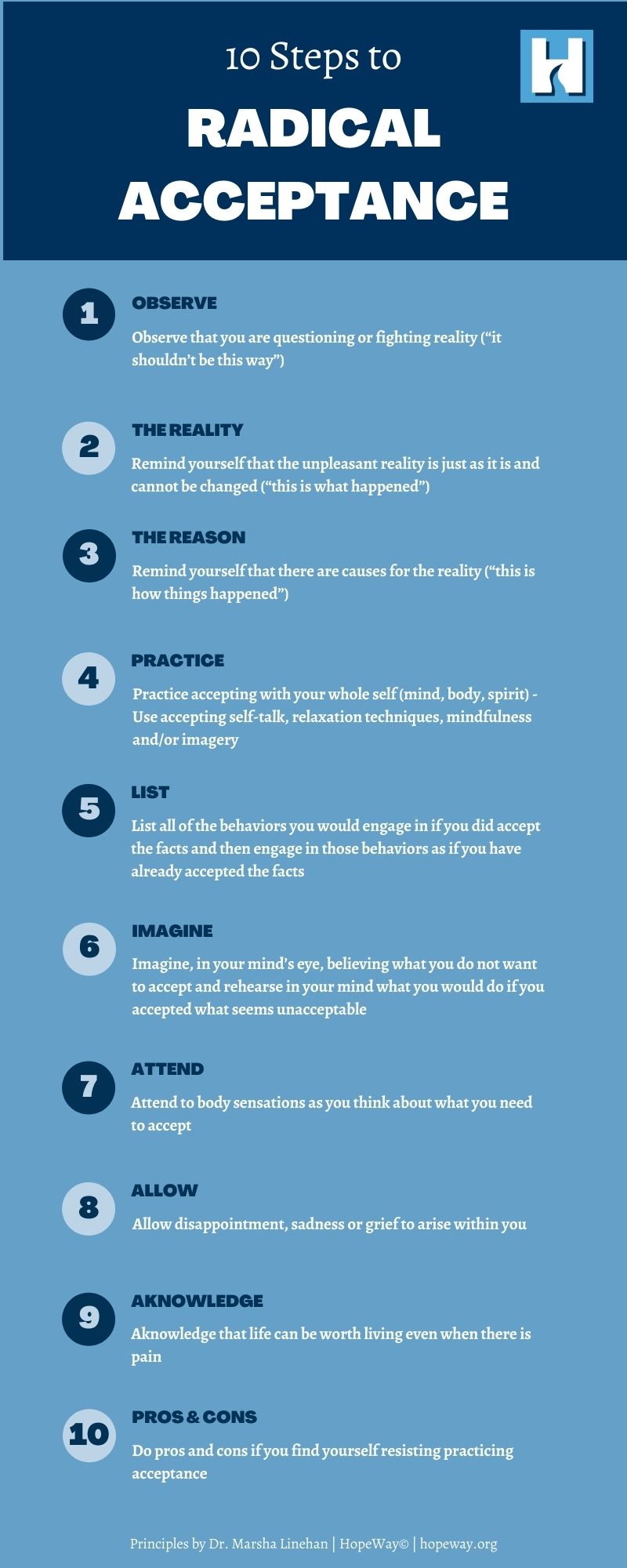Radical Acceptance in a Time of Uncertainty
June 08, 2022
Written by Andrew Harris, MS, LCMHC, Primary Therapist
In this time of uncertainty, it is both understandable and valid to feel anxious. Of course you are anxious; we have never lived through something like COVID-19 and the amount of information (and misinformation) is overwhelming, to say the least. While what we are dealing with is unprecedented, there is a skill from Dialectical Behavior Therapy (DBT) that can help us get through this difficult time.
What is Radical Acceptance?
Radical acceptance is a distress tolerance skill that is designed to keep pain from turning into suffering.
While pain is part of life, radical acceptance allows us to keep that pain from becoming suffering. By accepting the facts of reality without responding by throwing a tantrum or with willful negligence. In other words, it is what it is.
This does not mean we roll over and become helpless; rather, we acknowledge that denying the facts of reality will not change the facts, but keeps us stuck in thoughts such as “this is unfair”, “why me?”, and “why now?”.
Radical acceptance is NOT approval, but rather completely and totally accepting with our mind, body and spirit that we cannot currently change the present facts, even if we do not like them. By choosing to radically accept the things that are out of our control, we prevent ourselves from becoming stuck in unhappiness, bitterness, anger and sadness and we can stop suffering.
The Coronavirus is here and it is scary, but no matter how unfair it is, no matter what plans have had to change, the job it might cost you, we cannot change the fact that it is here and is impacting our lives.
Completely and totally accepting this fact is still challenging and painful, but focusing on what we can control versus what we cannot, can be liberating. It frees up all of the energy we were using to fight reality, and helps us use it to focus on how we can effectively cope with the situation and take care of ourselves.
Here are the 10 steps to practicing Radical Acceptance according to DBT’s founder, Marsha Linehan:
-
 Observe that you are questioning or fighting reality (“it shouldn’t be this way”)
Observe that you are questioning or fighting reality (“it shouldn’t be this way”) -
Remind yourself that the unpleasant reality is just as it is and cannot be changed (“this is what happened”)
-
Remind yourself that there are causes for the reality (“this is how things happened”)
-
Practice accepting with your whole self (mind, body, spirit) - Use accepting self-talk, relaxation techniques, mindfulness and/or imagery
-
List all of the behaviors you would engage in if you did accept the facts and then engage in those behaviors as if you have already accepted the facts
-
Imagine, in your mind’s eye, believing what you do not want to accept and rehearse in your mind what you would do if you accepted what seems unacceptable
-
Attend to body sensations as you think about what you need to accept
-
Allow disappointment, sadness or grief to arise within you
-
Acknowledge that life can be worth living even when there is pain
-
Do pros and cons if you find yourself resisting practicing acceptance
Hello, I’m Andrew Harris. I am one of the primary therapists here at HopeWay. One of the treatment modalities that I practice both in individual and group therapies is dialectical behavior therapy, or DBT. So, the dialectic in this case meaning that two seemingly opposite things can be true at the same time. So, both “you're right” and “I'm right,” “you're doing the best you can” and “you could be doing better,” “you are anxious” and “you're okay at the same time.” It is not this either or, black or white which we tend to think of, so it really helps us find the gray, the middle path. So DBT is broken up into four different modules: mindfulness, distress tolerance, emotion regulation, and interpersonal effectiveness. Among those four modules, distress tolerance, there's a particular skill that I find really helpful in my own life and I think a lot of people can find helpful in their lives as well. This skill is called radical acceptance. What this skill is designed to do is to help keep pain from turning into suffering. Pain as we all know in life is unavoidable, so this is a skill that's designed to not again eliminate that pain, but keep that pain from turning into suffering. When we ruminate, when we get stuck in “this is unfair,” “woe is me,” “why why why,” which is all completely understandable, it tends to keep us stuck and turns that pain into more prolonged pain or suffering. So the acceptance piece of this is not approval. When we tend to think of acceptance interpersonally we think “I accept this person,” “I approve of this person.” Acceptance is not approval in this case, it is recognizing however that the facts of reality are what they are and typically when we fight reality, fighting that reality does not change reality. Some examples include mistakes we've made in the past and then beating ourselves up for that over and over and over again. One of the things for myself and my own anxiety, I had a panic attack when I was about 25 and for years after that I really struggled with managing that anxiety and anytime I felt anxious I would get upset and angry and woe was me. It happened while I was driving. It used to be one of my favorite things to do and then all of a sudden I was terrified of it. So, getting stuck in the woe is me and so much of my energy went to that where, when I learned the skill radical acceptance, getting to a place of accepting my anxiety and again, seems really counterintuitive because when we think of acceptance we think of approval, but it is not saying like, “yay I love my anxiety” but it's recognizing that I have anxiety and fighting that was only making it worse. So getting to a place of acceptance and recognizing that “okay this is part of who I am” and not fighting it any longer really freed up so much energy for me to be able to manage it more effectively. Now when I get anxious, which I still do, I recognize it, I'm calm, I say “well makes sense I'm feeling anxious, I have anxiety, and I’m okay.” That’s kind of the dialectic that I can be both anxious and I'm okay at the same time, versus my mindset was, “if I'm anxious, I am not okay, this is intolerable I cannot handle this.” So, it's been a really effective skill for me to again free up that energy and get me unstuck from the anger and the bitterness of “all right why did this happen to me, this is so wildly unfair.” So, even though this is a difficult skill to practice, it is one that's really benefited me quite a bit and I hope that you find some benefit from it as well.
 Andrew Harris, MS, LCMHC
Andrew Harris, MS, LCMHC
Andrew Harris is a Licensed Clinical Mental Health Counselor with over 20 years of clinical experience including individual, group and family therapy, intensive in-home services, eating disorder treatment and assessment and diagnostic services. Over the course of his career, Andrew has worked with children, adolescents and adults in outpatient and inpatient settings. At HopeWay, Andrew carries a caseload of individual clients, facilitates many of the therapeutic groups and leads a community support group for men. Andrew’s extensive knowledge of Cognitive Behavioral Therapy and Dialectical Behavioral Therapy provides the foundation for him to be an effective and meaningful clinician, helping clients achieve their goals and live a healthy and fulfilling life. Outside of work, Andrew enjoys spending time with his family, hiking and watching any kind of sporting event.
Learn About HopeWay's Programs
